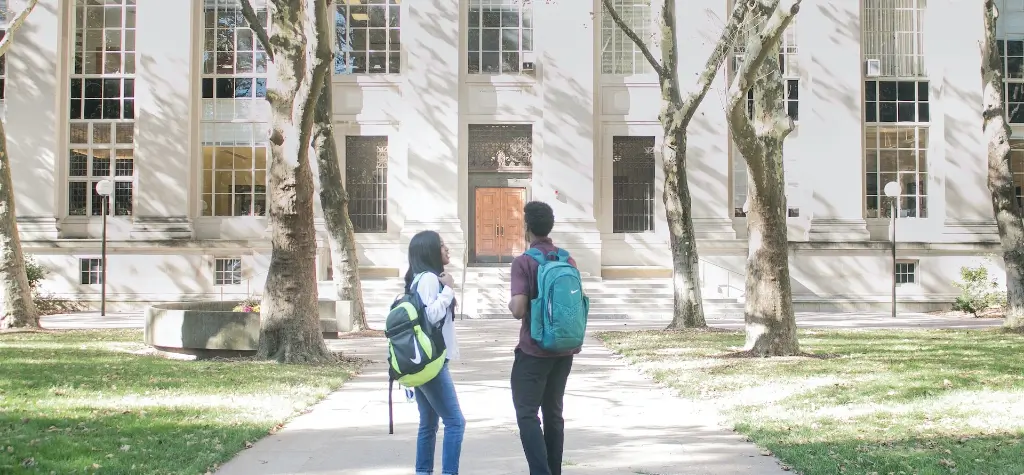College is an expensive and time-consuming commitment, so you want to make sure that you’re picking the perfect school for you! But the best school can look different for everyone. Here are some things to consider before choosing your future university.
Location
For many students, college is the first chance you have to explore the world. Because of that, many of us set our sights on universities across the country or even the world. And while that might work for some, it’s definitely not the best option for everyone.
When you’re looking at a potential school to apply to, consider the following:

Climate
We can always adapt to new locations and weather conditions, but a new climate is an important factor when selecting a college campus.
If you’re from the south, it may be hard to adapt to northern winters. Or, if you’re coming from the flat plains of Texas, the mountains of Colorado might have you struggling to catch your breath.
Distance from Home
College is a great excuse to get out there and gain some independence. In some ways, being far from family can help enforce that growth. But if you’re a family-oriented individual, maybe staying a little closer to home is a good idea.
Transportation
Some college towns have great public transportation options, others may require a car to get around. Consider the area around your school and how you’ll be able to get around. In a place like California, you’ll need a driver’s license to get basically anywhere. But in New York or Chicago, hopping on the train or riding your bike may be the easier option.
Finances
Unfortunately, there isn’t one universal price for a college education. Typically, you’ll get a better deal on universities in your home state. Out of state tuition is notoriously steep no matter where you go to school, and certain areas will be even more expensive. But most universities offer ways to save on the sticker-price tuition.
Cost
Depending on the school, its location, and its prestige, the price of tuition can fluctuate. And remember, just because a school is expensive, doesn’t mean that it’s higher quality. You can find a great education anywhere, no matter the price tag. But at the same time, don’t let the price of university scare you off—there are always ways to save.
Loans
Loans are sums of money that a bank can temporarily give to you to pay for expensive things. You’re probably familiar with the idea of taking out a loan in order to pay for a house or for school. You’re able to pay back your loans over time, usually with an added interest. They’re handy in a pinch, but you’ll be on the hook to pay it all back!
Scholarships
The most well-known way to receive financial aid is through applying for scholarships. These are financial aid awards that can be given out for a variety of reasons. Some students may qualify for scholarships based on academics, arts, or through a contest submission. Certain scholarships may have GPA requirements to maintain your financial aid. But overall, it’s better than taking out a loan because you won’t have to worry about paying it back.
Grants
Grants are forms of financial aid that are reserved for students with significant financial need. You can receive grants through the government or through your school. Like scholarships, you won’t have to worry about paying it all back. But there are usually eligibility requirements you need to meet in order to keep receiving grant money.
You can learn about which government grants you qualify for when you fill out your FAFSA. Schools will notify you of their own unique financial aid options once you’re accepted. Keep in mind that if you withdraw from school, or if you don’t meet the requirements for your grant, you may be on the hook to repay it.
Jobs and Internships
Many college students try to land a job while attending school. It’s a good way to get work experience while also earning some pocket cash to keep you afloat. Getting an on-campus job is convenient, usually low stress, and gives you some extra time to get your homework done. But they may not pay as well as something off campus. For some students, you may even qualify for a work-study program. This is essentially the same thing as getting a part time job on campus, but your wage goes back into paying your tuition.
Internships are great because you can get relevant job experience and money. And if you land a paid internship, you can usually expect to get a pretty good wage for the work you’re doing. But it’s important to remember that most internships only last for a semester, so be prepared to find a new gig once it’s over!

Academics
While many of us go to college for the experience, the education you’ll receive is priceless! That’s why you need to pick the school that best fits you and your future goals. Here are some things to consider when it comes to academics:
Majors and Course Selection
Each university specializes in unique areas of study. For example, while creative writers may find their home at UC Berkeley, engineers may want to set their sights on MIT. While you can get a good education anywhere, it doesn’t hurt to try and find a school that specializes in your course of study.
Class Size
If you’re a social butterfly with the desire to meet as many people as you can, you’ll probably love big schools like Arizona State or University of Southern California. Large universities can have thousands of students, with class sizes being in the hundreds.
Not feeling the idea of crowds? Then you’ll probably be better off applying for smaller, more private universities. With schools like this, the student population is smaller, and so are the classes.
Academic Support
Chances are, you’re going to be overwhelmed at some point in your college career. In times like this, it’s important to have support there! That’s why you should examine the academic support you have on campus. This can include things like:
- Tutoring Services
- Academic Advisors
- Professor Office Hours
- Teacher’s Assistant Office Hours
- Writing Centers
Graduation Rate
If the graduation rate of a school is low, that could be a warning sign. A good graduation rate should sit around 70-80% or higher. But if it’s any lower, it could suggest that the school may struggle with funding, student retention, or academics. If other students are thriving, there’s a good chance you will too!
Extracurriculars
You’ll go crazy if you’re only studying all day. You’ll need to make some room for extracurriculars! Before committing to a school, see what else they have to offer aside from academics.

Sports
Some students are invited to play sports on behalf of the university, but even if you aren’t the one on the field, it’s super fun to get involved! You can join club sports, take a class, or even just show up to games and cheer on your home team.
Clubs
Not the athletic type? That’s okay too! Chances are, there’s a club on campus that’s perfect for you. From fashion, to politics, to arts and culture, there’s a club for just about every person on campus. It’s a great way to kill some time, make some friends, and strengthen your resume.
Study Abroad
One thing everyone will tell you: college is the best time to travel abroad. You can explore new cultures for a longer period of time, for less money, and for college credits! You simply cannot come up with a good reason not to study abroad.
Campus Life
Nothing else on this list will matter if you don’t enjoy life at your university. If you’re planning to spend four years on this campus, you should at least like it there! Here are some things to consider about life on campus:
Campus Safety
If you don’t feel safe, you’ll never be able to warm up to your new campus. Check and see what safety measures the university has in place to keep their students feeling safe and secure. Is the campus well lit? Are there emergency call boxes or on-campus police? Take some time to consider what it would take for you to feel safe on campus.
Student Housing
If you’re moving out of state to attend school, it’s important to know where you’re staying! While almost every university will offer some sort of campus housing, you’re going to need to have everything ironed out before you show up on move-in day. Before applying, make sure that there is enough housing to accommodate you, as well as the quality of said housing! And if you plan to live in an off-campus apartment, make sure to account your rent and utilities in your monthly budget.
Make Moving Easier with Collegeboxes!
Once you decide where to go to school, Collegeboxes is here to help you get there. We can ship your belongings anywhere in the world, store them for as long as you like, or even ship and have them delivered right to your dorm room. No matter where you’re going, we’re there to take some work off your plate.
